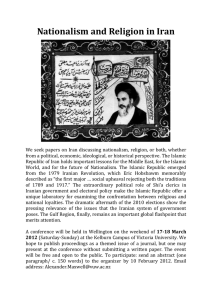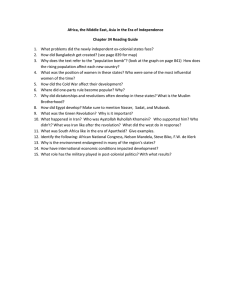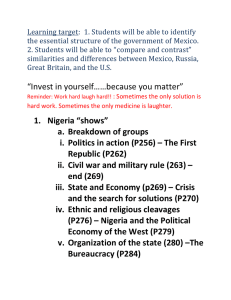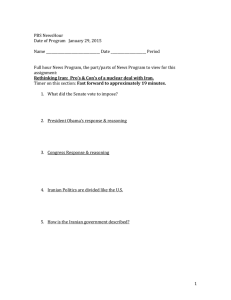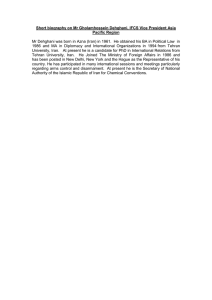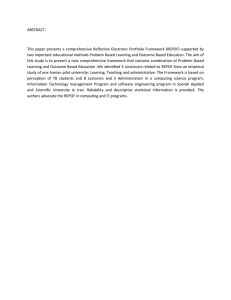A General Assembly Report of the Working Group on the Universal Periodic
advertisement
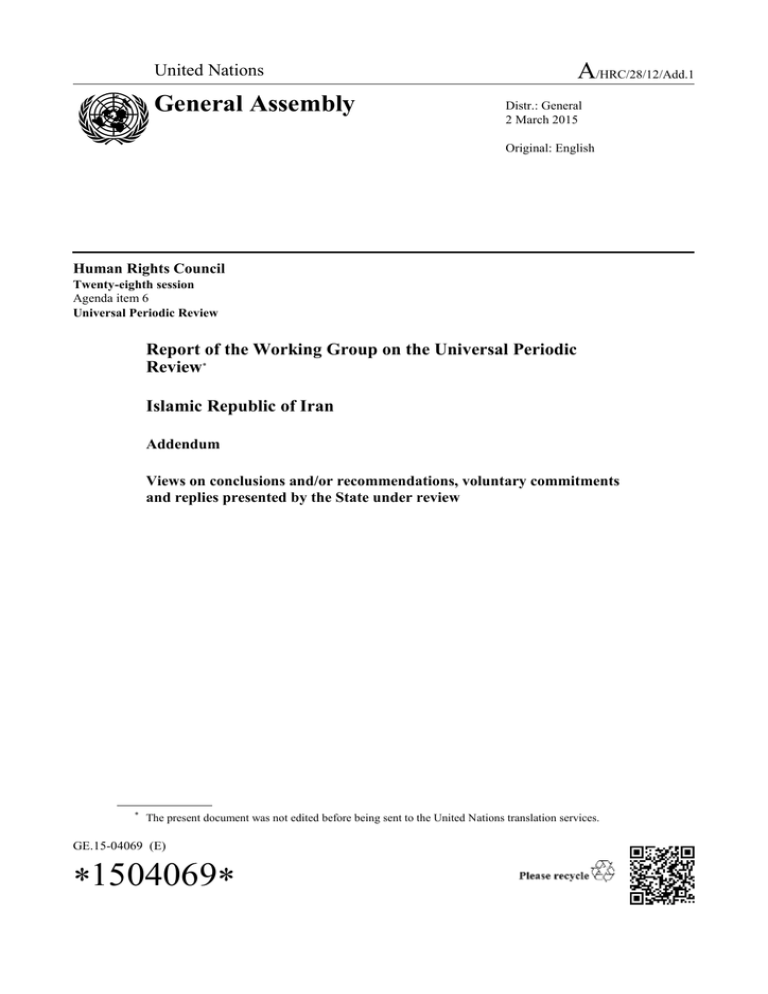
A/HRC/28/12/Add.1 United Nations General Assembly Distr.: General 2 March 2015 Original: English Human Rights Council Twenty-eighth session Agenda item 6 Universal Periodic Review Report of the Working Group on the Universal Periodic Review* Islamic Republic of Iran Addendum Views on conclusions and/or recommendations, voluntary commitments and replies presented by the State under review * The present document was not edited before being sent to the United Nations translation services. GE.15-04069 (E) A/HRC/28/12/Add.1 1. The Islamic Republic of Iran participated actively and constructively in the second cycle of the UPR on 31 October 2014 at its 20th session during which received 291 recommendations. Iran wishes to reiterate once again its full support for the Human Rights Council’s UPR mechanism. 2. Adoption and implementation of the “Institution- Building of the United Nations Human Rights Council” contained in document A/HRC/RES/5/1, the UPR expected to serve as a cooperative mechanism of the Council based on objective and reliable information and on interactive dialogue to ensure universal coverage and equal treatment of all States anchored in objective, transparent, non-selective, constructive, non confrontational and non- politicized manner 3. The Islamic Republic of Iran expresses its sincere appreciation to all countries that participated actively and constructively in the second cycle of Iran’s UPR and presented their recommendations on the basis of the afore-mentioned principles. Iran also thanks the Troika and the Secretariat of the UPR division of the Council for their cordial cooperation and assistance. 4. The Islamic Republic of Iran has reviewed carefully and devotedly all the recommendations made during the Iran’s second cycle of the UPR. Accordingly, the High Council of Human Rights of Iran, as the national focal point in charge, communicated all the recommendations to the relevant ministries, agencies and governmental institutions for their careful and thorough review. We have also conducted broad and extensive consultations with other stakeholders, including civil society and NGO's. Therefore, all recommendations have been meticulously examined by various authorities and experts from legal, political, economic, social, cultural and administrative aspects. 5. The Islamic Republic of Iran has the honor to convey its support for about 65% of recommendations received. It is worth mentioning that many of the recommendations enjoyed the support of Iran include those that have been already implemented to a large extent, or are on the processes of implementation, or considered as acceptable and implementable in the framework of our national laws and development plans. Moreover, some of the recommendations, despite the employment of indecent wordings and flawed assumptions have been partially accepted, purely for their substantive important objectives. Finally, it should be clarified that those recommendations which did not gain the support of Iran considered contravening prevailing basic national laws and values. 6. In conclusion, the Islamic Republic of Iran wishes to reiterate its firm commitment to continue constructive cooperation with the United Nations human rights machineries, in particular with the Human Rights Council and the UPR mechanism. Iran believes that the UPR is the most pertinent, effective and trustful UN mechanism for the review of human rights situation of all States. 7. Position of the Islamic Republic of Iran with respect to each recommendation presented at the second cycle of its UPR is as follows: (a) Recommendations which enjoy the support of the Islamic Republic of Iran: To fulfill its unyielding commitment to protect and promote human rights for all its citizens, and to implement its national policies and plans on promoting and enhancing basic and fundamental human rights and freedoms and to bring about happiness, prosperity and welfare for all people of different walks of society, Iran will support the following recommendations: 138.20, 138.35, 138.46, 138.58, 2 138.25, 138.36, 138.47, 138.59, 138.26, 138.37, 138.48, 138.60, 138.27, 138.38, 138.49, 138.61, 138.28, 138.39, 138.50, 138.62, 138.29, 138.40, 138.51, 138.63, 138.30, 138.41, 138.52, 138.64, 138.31, 138.42, 138.53, 138.65, 138.32, 138.43, 138.55, 138.66, 138.33, 138.44, 138.56, 138.67, 138.34, 138.45, 138.57, 138.68, A/HRC/28/12/Add.1 138.77, 138.79, 138.80, 138.82, 138.83, 138.85, 138.86, 138.87, 138.88, 138.93, 138.94, 138.97, 138.98, 138.99, 138.101, 138.103, 138.104, 138.107, 138.108, 138.109, 138.110, 138.114, 138.181, 138.182, 138.186, 138.187, 138.194, 138.198, 138.199, 138.206, 138.213, 138.217, 138.219, 138.220, 138.221, 138.224, 138.235, 138.236, 138.239, 138.240, 138.241, 138.242, 138.243, 138.244, 138.246, 138.247, 138.248, 138.249, 138.250, 138.251, 138.252, 138.253, 138.254, 138.255, 138.256, 138.257, 138.258, 138.259, 138.260, 138.261, 138.262, 138.263, 138.264, 138.265, 138.266, 138.267, 138.268, 138.269, 138.270, 138.271, 138.272, 138.273, 138.274, 138.275, 138.276, 138.277, 138.278, 138.279, 138.280, 138.281, 138.285, 138.287, 138.288, 138.289, 138.290, 138.291. (b) Recommendations which enjoy partial support of the Islamic Republic of Iran: Despite the fact that some of the recommendations provided during the UPR session of Iran are either having the language which is contrary to the principles enshrined in the Institution-Building of Human Rights Council or are abusive and offensive, the Islamic Republic of Iran partially supports this package of recommendations based on their merits and its serious resolve to protect and promote human rights at national level. Moreover, it should be taken into account that full implementation of some of these recommendations is contrary to our constitution, basic laws and Islamic values. Needless to say, the course of action required to amend current laws need time and lengthy deliberations among different constituent parts in the legislative process. In passing new legislations, we need to take into consideration the view of all the relevant governmental and non-governmental actors. For this reason, only those parts that are adaptable with subjects mentioned in the recommendations will be supported. 138.6, 138.7, 138.8, 138.12, 138.54, 138.69, 138.72, 138.73, 138.74, 138.75, 138.76, 138.78, 138.81, 138.84, 138.89, 138.90, 138.91, 138.92, 138.95, 138.100, 138.102, 138.106, 138.111, 138.112, 138.113, 138.117, 138.118, 138.119, 138.122, 138.127, 138.131, 138.135, 138.156, 138.183, 138.184, 138.185, 138.190, 138.192, 138.193, 138.195, 138.196, 138.204, 138.205, 138.207, 138.208, 138.209, 138.210, 138.211, 138.212, 138.214, 138.216, 138.226, 138.229, 138.231, 138.234, 138.237, 138.282, 138.284, 138.286. (c) Recommendations which do not enjoy support of the Islamic Republic of Iran: The Islamic Republic of Iran has done its utmost to accept maximum number of recommendations presented by different country, which can be observed from the number of accepted recommendations made by many countries from all geographical regions of the world. However, for reasons mentioned below, some recommendations are not supported: • Some recommendations were made without due regard to the fundamental values and Islamic teachings governing our society. • Some recommendations contravene substantively the Constitution and basic laws of the Country. • Some recommendations are vividly contravene the spirit of cooperation as stipulated in the IBT by using accusatory allegations in ambiguous and inappropriate language with the aim to suggest unacceptable presumptions and claims. • Moreover, the content of some of the recommendations is not compatible with the names of provinces and administrative divisions. If the wordings and flaws in these recommendations have been corrected, they would have been enjoyed the support of Iran. Below is the list of recommendations that was not supported by Iran: 3 A/HRC/28/12/Add.1 138.1, 138.2, 138.3, 138.4, 138.5, 138.9, 138.10, 138.11, 138.13, 138.14, 138.15, 138.16, 138.17, 138.18, 138.19, 138.21, 138.22, 138.23, 138.24, 138.70, 138.71, 138.96, 138.105, 138.115, 138.116, 138.120, 138.121, 138.123, 138.124, 138.125, 138.126, 138.128, 138.129, 138.130, 138.132, 138.133, 138.134, 138,136, 138.137, 138.138, 138.139, 138.140, 138.141, 138.142, 138.143, 138.144, 138.145, 138.146, 138.147, 138.148, 138.149, 138.150, 138.151, 138.152, 138.153, 138.154, 138.155, 138.157, 138.158, 138.159, 138.160, 138.161, 138.162, 138.163, 138.164, 138,165, 138.166, 138.167, 138.168, 138.169, 138.170, 138.171, 138.172, 138.173, 138.174, 138.175, 138.176, 138.177, 138.178, 138.179, 138.180, 138.188, 138.189, 138.191, 138.197, 138.200, 138.201, 138.202, 138,203, 138.215, 138.218, 138.222, 138.223, 138.225, 138.227, 138.228, 138.230, 138.232, 138.233, 138.238, 138.245, 138.283. (d) Specific explanations and observations: • Recommendations 1: This recommendation is assumed to be ambiguous. To this day, Iran has joined numerous international human rights treaties and conventions. In Iran like other countries, acceding international conventions requires certain domestic procedures and formalities as well as review by the legislative apparatus and requirement of ratification. Unfortunately, this recommendation substantially ignores this fact. • Situation of women in Iran and relevant recommendations: From its very inception, the Islamic Republic of Iran has paid special attention to advancement and promotion of woman’s rights and status. Proceeding from this goal, Iran has carried out extensive reforms in improving health and education situation of women, combating poverty, and generating employment, providing safer environment for women, fighting violence against them and increasing economic, social and political participation of women in society. In addition to laws governing violence against women in public places, Iran has also taken measures against domestic violence. According to the Note to Article 1130 of the Civil Code of Iran, battering or any form of abusive behavior of women can serve as a reason for demanding divorce by the wife, in addition to punishment sanctioned by law. In line with its overall policy to support women's right, Iran will support many of the recommendations proposed in this cycle of the UPR. • Recommendations 6 and 8: Articles 32, 38 and 39 of the Constitution of the Islamic Republic of Iran strongly forbid use of torture, and the Legislator in Article 169 of “the Islamic Penal Code” and paragraphs 1, 6, 7, 9, 10 of the “Single Article Act concerning Respect for Legitimate Freedoms and Protection of Citizen's Rights” and Article 169 of “Implementing Regulations for Prison and Correctional Organization” prohibit use of all forms of torture and impose heavy punitive measures to ensure prevention of torture. Iran has also taken practical measures to boost supervisor functions by creating a central supervisory board for protection of citizen's rights in the capital and provinces. The Judiciary of Iran has sent inspection teams to relevant institutions, and reports received concerning alleged violations are investigated. In addition, the Legislator has envisaged complaint mechanism for the claimants of violations of citizens' rights, including complaints concerning use of torture. This complaint mechanism is available in legislation concerning "Legitimate Freedoms and Citizens' Rights". This legislation holds relevant authorities accountable and provides arrangements for complaints against them through supervisory board, as envisaged in the law. As a result of more robust supervisory measures, we have witnessed substantial decline in the number of complains that have been received by the “Inspection Boards” in recent years. It is noteworthy mentioning that measures taken by the relevant bodies in Iran correspond to objectives of the UN Convention against Torture. Moreover, research departments 4 A/HRC/28/12/Add.1 of these institutions are currently carrying out more studies on the provisions of the Convention. • Recommendation 18: The Islamic Republic of Iran attaches great importance to promotion of the rights of the child. For this reason, beside numerous national initiatives, Iran has also joined the Convention of the Rights of the Child and its second Optional Protocol on the Sale of Children, Child Prostitution and Child Pornography. In keeping with its intention to implement the Convention, Iran established its National Committee on the Rights of the Child, and in line with the provisions of this convention, it has submitted three periodic reports to the relevant monitoring body. Iran, like a number of other countries, acceded to this convention by placing a general reservation in light of its religious principles and culture. For this reason, Iran cannot support recommendations that are contrary to this reservation. In the laws of Iran, in light of Islamic teachings, a person that has reached the age of maturity and is of sound mind has the possibility of marrying freely and forming a family with due regard to his/her legal obligations and personal interests. In addition, forced marriage is forbidden in accordance with Article 1062 of the Civil Code of Iran and is totally irrelevant. Marriage with a person that has not reached the age of maturity is forbidden and punishable according to Article 646 of the Penal Code. • Recommendation 47: From the very day that Islamic Revolution triumphed in Iran, the scourge of terrorism that has benefitted from the support of certain foreign countries has been one of the serious violations of fundamental rights of Iranian citizens, especially the right to life and right to enjoy security and peace. Close to 17,000 Iranian people have lost their lives as the direct result of terrorism and over the past five years, 5 Iranian nuclear scientists have been assassinated. Unfortunately, our neighboring region has been seriously affected by the scourge of terrorism in recent years. The Islamic Republic of Iran will accept this recommendation and will continue its efforts to raise awareness about negative consequences of terrorism and prevent application of double standards with respect to this evil phenomenon. • Recommendations 46 and 52: Needless to say, imposed and illegal sanctions, especially unilateral coercive measures and sanctions are contrary to the Charter of the United Nations, international law, international human and humanitarian law in particular the Covenants. They also have a negative impact on the enjoyment of most basic and fundamental human rights of citizens of targeted countries. Also, majority of countries of the world do not regard these sanctions as legitimate and justifiable and regard imposition of economic sanctions against citizens of a country to be in clear contradiction to all norms and standards of human rights. Therefore, by accepting these two recommendations, the Islamic Republic of Iran will continue to protect the rights of its people by standing against imposition of economic sanctions. • Recommendation 89: This recommendation is ambiguous and should be noted that the Constitution and other laws of the Country emphasize insistently on rejection of discrimination and there is no need for new comprehensive legislation in this connection. • Recommendation 143: According to the Islamic norms and the laws of Iran as well as cultural principles advocated by the people on the importance of the family, sexual relations between individuals is only allowed in the framework of wedlock. Moreover, the law forbids any form of persecution and maltreatment of an Iranian citizen regardless of their physical and psychological status, and offenders are dealt with in accordance with the law. In addition, according to Islamic laws, meddling in private affairs of individuals without any discrimination is forbidden. Sex change 5 A/HRC/28/12/Add.1 surgery is operated in Iran, only on the basis of people request. There are considerable requests even from foreign nationals to these operations in Iranian hospitals due to advance medicine and low coast of operation, in order to have the possibility of a better life. 8. It is worth noting that, due to wording limitation (President statement 9/2), more explanations concerning recommendations129, 231 and 285, as well as, on the death penalty, cooperation with Special procedures and OHCHR, have not been possible to be mentioned in the current addendum. 6
